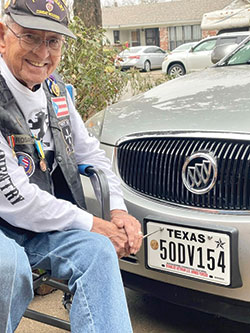Korean War veteran served in U.S. military regiment from Puerto Rico

Thanks to a DAV chapter’s work, the service of the U.S. military’s only segregated Puerto Rican regiment has gained special recognition in the state of Texas.
The Army’s 65th Infantry Regiment was nicknamed the “Borinqueneers” in honor of the native Taino name for the island, Borinquen. According to the Center for Puerto Rican Studies, the regiment was barred from front-line service during World War II and suffered minimal casualties during the conflict. By the time the Korean War broke out, the combat regiment had become “superbly trained and well-disciplined.” It was activated and mobilized to the peninsula.
Roughly 61,000 Puerto Ricans fought in the Korean War, many serving with the 65th. Among those numbers, 3,540 Puerto Ricans became casualties of war, with 747 killed in action. The regiment was the military’s last segregated unit.
Luis Cortes, commander of DAV Chapter 114 in Helotes, Texas, recognized the importance of honoring the Borinqueneers’ sacrifices and unique service. He successfully advocated for the creation of the license plate in Texas, as well as naming a 2-mile stretch of Texas highway for the unit and the DAV chapter.
In March 2022, retired Army Sgt. 1st Class Angel Rosario was among the first to obtain a Texas license plate bearing the unit’s name and an image of the Congressional Gold Medal that was bestowed upon the regiment on April 13, 2016—the date is now recognized annually as National Borinqueneers Day.

Rosario, a 92-year-old Yauco, Puerto Rico, native and a longtime Killeen, Texas, resident, is a Purple Heart recipient. He served in Korea from 1951 to 1952. He remembers being aboard a ship from Puerto Rico to Korea for 35 days and starting to fight, in the snow, almost immediately after landing.
“I am so happy to know that we, and the history of the 65th Infantry Regiment, will not be forgotten thanks to DAV,” Rosario said.
In December 1950, Borinqueneers defended the frozen, rocky hilltops above the port city of Hŭngnam from encircling Chinese forces. The regiment’s actions helped 105,000 service members and more than 100,000 civilians board ships at Hŭngnam at the conclusion of the 1st Marine Division’s valorous breakout from the Chosin Reservoir. And 1951, the 65th Infantry famously led the last battalion-sized fixed-bayonet charge in U.S. Army history.
The unit also faced discrimination. In 1952, nearly eight dozen of the unit’s members were court-martialed and subsequently punished for failing to obey orders and take a series of objectives known as Jackson Heights—Hill 391—in Korea. A number of elements led to the mission failure, including the intense barrage of enemy artillery and mortar fire, heavy casualties and severe language barriers. By 1954, Army Secretary Robert Stevens had overturned the convicted soldiers’ sentences.
“It’s so important we find ways to enshrine the legacies of our veterans,” said National Commander Andy Marshall. “This helps us to ensure we are not losing the experiences of these brave individuals to the pages of history.”
While the regiment was deactivated in 1956, a battalion of the Borinqueneers remains active as part of the Puerto Rico Army National Guard.
Korea is often called “the forgotten war,” so it’s no surprise that the sacrifices of the Borinqueneers was often left out of news accounts and histories, Cortes said, adding that the honors touch the hearts of the veterans, their families and their descendants.
“These individuals have been waiting for years of their lives to be acknowledged,” Cortes said.
